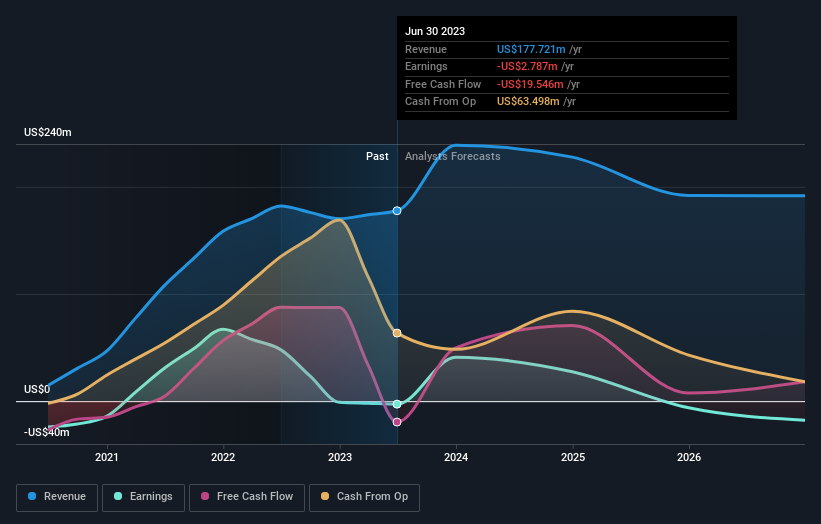Rex International Holding Limited (SGX:5WH) most popular amongst individual investors who own 52%, insiders hold 44%
Key Insights
The considerable ownership by individual investors in Rex International Holding indicates that they collectively have a greater say in management and business strategy
A total of 17 investors have a majority stake in the company with 48% ownership
Insiders own 44% of Rex International Holding
If you want to know who really controls Rex International Holding Limited (SGX:5WH), then you'll have to look at the makeup of its share registry. And the group that holds the biggest piece of the pie are individual investors with 52% ownership. In other words, the group stands to gain the most (or lose the most) from their investment into the company.
Meanwhile, individual insiders make up 44% of the company’s shareholders. Generally speaking, as a company grows, institutions will increase their ownership. Conversely, insiders often decrease their ownership over time.
Let's delve deeper into each type of owner of Rex International Holding, beginning with the chart below.
See our latest analysis for Rex International Holding

What Does The Institutional Ownership Tell Us About Rex International Holding?
Institutions typically measure themselves against a benchmark when reporting to their own investors, so they often become more enthusiastic about a stock once it's included in a major index. We would expect most companies to have some institutions on the register, especially if they are growing.
Less than 5% of Rex International Holding is held by institutional investors. This suggests that some funds have the company in their sights, but many have not yet bought shares in it. If the company is growing earnings, that may indicate that it is just beginning to catch the attention of these deep-pocketed investors. It is not uncommon to see a big share price rise if multiple institutional investors are trying to buy into a stock at the same time. So check out the historic earnings trajectory, below, but keep in mind it's the future that counts most.

Hedge funds don't have many shares in Rex International Holding. Because actions speak louder than words, we consider it a good sign when insiders own a significant stake in a company. In Rex International Holding's case, its Senior Key Executive, Karl Helge Tore Lidgren, is the largest shareholder, holding 35% of shares outstanding. Meanwhile, the second and third largest shareholders, hold 5.6% and 1.2%, of the shares outstanding, respectively. Interestingly, the second-largest shareholder, Svein Helge Kjellesvik is also Chief Operating Officer, again, pointing towards strong insider ownership amongst the company's top shareholders.
Our studies suggest that the top 17 shareholders collectively control less than half of the company's shares, meaning that the company's shares are widely disseminated and there is no dominant shareholder.
While studying institutional ownership for a company can add value to your research, it is also a good practice to research analyst recommendations to get a deeper understand of a stock's expected performance. While there is some analyst coverage, the company is probably not widely covered. So it could gain more attention, down the track.
Insider Ownership Of Rex International Holding
The definition of an insider can differ slightly between different countries, but members of the board of directors always count. Management ultimately answers to the board. However, it is not uncommon for managers to be executive board members, especially if they are a founder or the CEO.
I generally consider insider ownership to be a good thing. However, on some occasions it makes it more difficult for other shareholders to hold the board accountable for decisions.
It seems insiders own a significant proportion of Rex International Holding Limited. Insiders own S$103m worth of shares in the S$237m company. We would say this shows alignment with shareholders, but it is worth noting that the company is still quite small; some insiders may have founded the business. You can click here to see if those insiders have been buying or selling.
General Public Ownership
The general public -- including retail investors -- own 52% of Rex International Holding. With this amount of ownership, retail investors can collectively play a role in decisions that affect shareholder returns, such as dividend policies and the appointment of directors. They can also exercise the power to vote on acquisitions or mergers that may not improve profitability.
Next Steps:
While it is well worth considering the different groups that own a company, there are other factors that are even more important. For instance, we've identified 1 warning sign for Rex International Holding that you should be aware of.
If you would prefer discover what analysts are predicting in terms of future growth, do not miss this free report on analyst forecasts.
NB: Figures in this article are calculated using data from the last twelve months, which refer to the 12-month period ending on the last date of the month the financial statement is dated. This may not be consistent with full year annual report figures.
Have feedback on this article? Concerned about the content? Get in touch with us directly. Alternatively, email editorial-team (at) simplywallst.com.
This article by Simply Wall St is general in nature. We provide commentary based on historical data and analyst forecasts only using an unbiased methodology and our articles are not intended to be financial advice. It does not constitute a recommendation to buy or sell any stock, and does not take account of your objectives, or your financial situation. We aim to bring you long-term focused analysis driven by fundamental data. Note that our analysis may not factor in the latest price-sensitive company announcements or qualitative material. Simply Wall St has no position in any stocks mentioned.

 Yahoo Finance
Yahoo Finance 